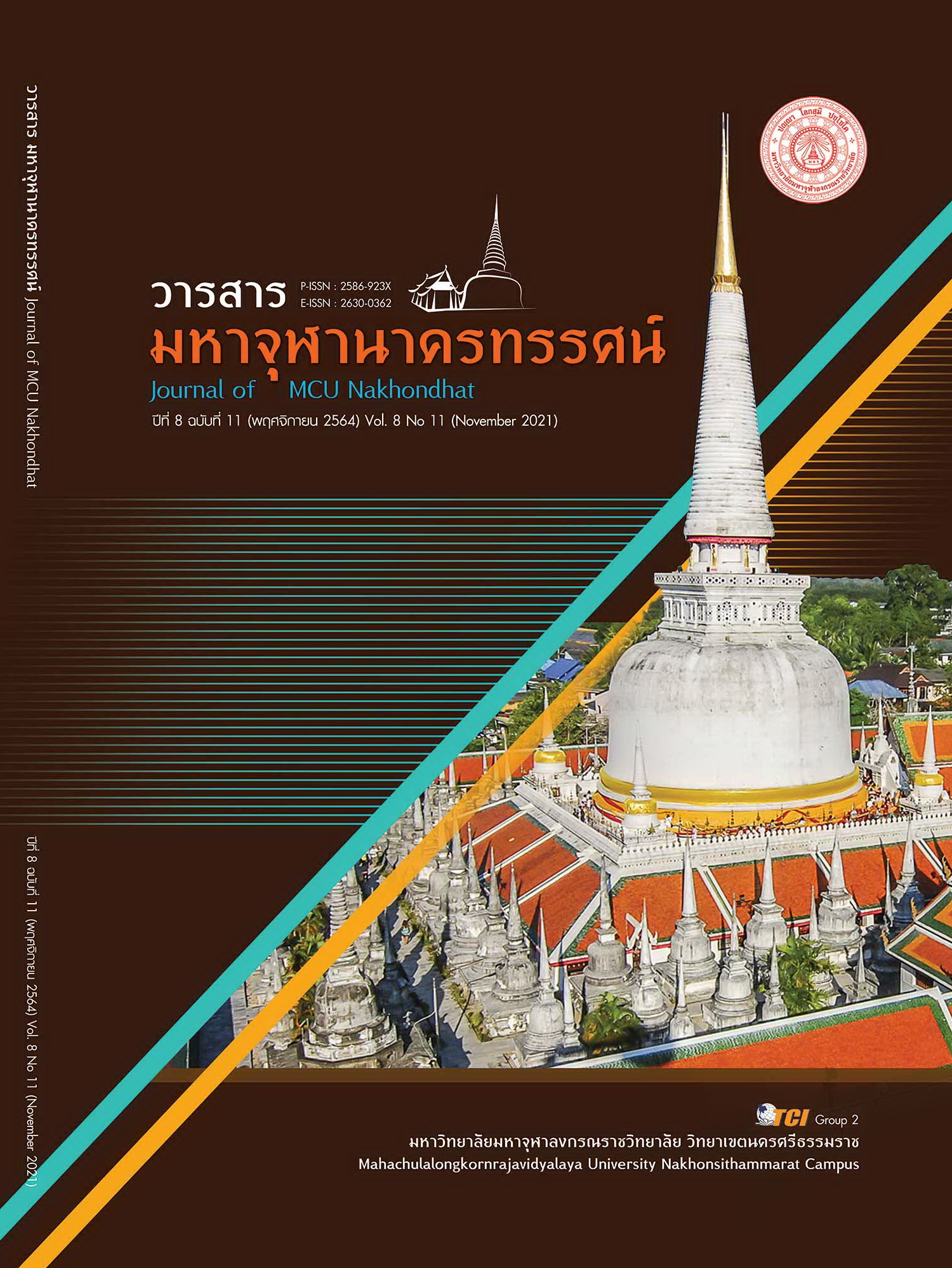THE PROMOTION FOR PERFORMIMG ROUTINE DUTIES OF THAI BUDDHIST MONKS IN THE 4.0 ERA
Main Article Content
Abstract
The objectives of this research article were to: 1) study kiccavatta in Theravada Buddhist texts; 2) study the promotion for performing routine duties of Thai monks from the past to Thai society; and 3) to analyze the promotion for performing routine duties of Thai monks in the 4.0 era. The study applied qualitative research by studying primary and secondary documents including conducting interviews with 42 monks in Nakhonratchasima province. The data were analyzed, synthesized for the body of knowledge, and presented by descriptive method. From the study, it was found that in Theravada Buddhist texts, kiccavatta refers to monks’ routine duties concerning the vinaya (discipline) and ācāra (conduct) that should be practiced between teachers and students. Kiccavatta has been carried out since the Buddha’s lifetime and continues in Thai society. Thai monks from ancient times had applied it to administer the Sangha according to the vinaya. The guidelines to promote consist of four phases: 1) The 1st phase is comprehending the issues, involving monks becoming aware of and comprehending problems including internal and external factors, and then establishing a plan and policy to address them together; 2) The 2nd phase is devising a solution, entailing monks devising a plan and developing tools leading to problem solving through activities that can motivate monks; 3) The 3rd phase is putting the plan into action, as when the problems and solutions have been identified, these will be the guidelines promoting monks to perform the ten duties on a regular and happy basis; and 4) The 4th phase is working together with society to tackle the problem, entailing monks finding guidelines with the community and society. This will lead to the examination and support among each other, resulting in effective practice of the ten duties and long-term prosperity of Buddhism in the 4.0 era.
Article Details
References
พระครูเกษมนวกิจ. (4 กันยายน 2563). วัตรในการรักษาผ้าครอง. (พระทวีโชค เจตนาสุโภ (อิ่มชื่น), ผู้สัมภาษณ์)
พระครูเกษมวิริยากร. (9 มกราคม 2563). วัตรในการปลงอาบัติ. (พระทวีโชค เจตนาสุโภ (อิ่มชื่น), ผู้สัมภาษณ์)
พระครูถาวรกิจจารักษ์ ดร. (16 กุมภาพันธ์ 2563). วัตรในการพิจารณาปัจจเวกขณ์ 4. (พระทวีโชค เจตนาสุโภ (อิ่มชื่น), ผู้สัมภาษณ์)
พระครูนันทธรรมโกวิท. (9 มกราคม 2563). วัตรในการปัดกวาดอาวาส วิหาร ลานเจดีย์. (พระทวีโชค เจตนาสุโภ (อิ่มชื่น), ผู้สัมภาษณ์)
พระครูพิพิธขันติธรรม. (12 กุมภาพันธ์ 2563). วัตรในการสวดมนต์สาธยาย. (พระทวีโชค เจตนาสุโภ (อิ่มชื่น), ผู้สัมภาษณ์)
พระครูศรีปริยัตยารักษ์ ดร. (25 ธันวาคม 2563). ข้อปฏิบัติกิจวัตรในการศึกษาสิกขาบทและปฏิบัติพระอาจารย์. (พระทวีโชค เจตนาสุโภ (อิ่มชื่น), ผู้สัมภาษณ์)
พระเทพสีมาภรณ์. (12 กุมภาพันธ์ 2563). วัตรในการลงอุโบสถ. (พระทวีโชค เจตนาสุโภ (อิ่มชื่น), ผู้สัมภาษณ์)
พระพรหมคุณาภรณ์ ป.อ. ปยุตโต. (กรุงเทพมหานคร 2558). พจนานุกรมพุทธศาสน์ ฉบับประมวลศัพท์. พิมพ์ครั้งที่ 24. กรุงเทพมหานคร: สำนักพิมพ์เพ็ทแอนด์โฮม จำกัด.
พระพิชัย ฐิตโสภโณ. (6 มกราคม 2563). วัตรในการพิจารณาผม ขน เล็บ. (พระทวีโชค เจตนาสุโภ (อิ่มชื่น), ผู้สัมภาษณ์)
พระสุทัศน์ กตสาโร. (2557). ศึกษารูปแบบการปฏิบัติธุดงควัตรในสังคมไทย. ใน วิทยานิพนธ์พุทธศาสตรดุษฎีบัณฑิต สาขาวิชาพระพุทธศาสนา. บัณฑิตวิทยาลัย: มหาวิทยาลัยมหาจุฬาลงกรณราชวิทยาลัย.
พระสุบรรณ ทีปธมฺโม. (8 มกราคม 2563). วัตรในการอยู่ปริวาสกรรม. (พระทวีโชค เจตนาสุโภ (อิ่มชื่น), ผู้สัมภาษณ์)
สถานเอกอัครราชทูตไทย ณ กรุงวอชิงตัน. (2564). รู้จักกับ Thailand 4.0 แบบเข้าใจง่าย อ่านรอบเดียว เล่าได้เป็นช่องเป็นฉาก. เรียกใช้เมื่อ 8 ม.ค 2564 จาก https://thaiembdc.org/th/รู้จักกับ-thailand-4-0-


